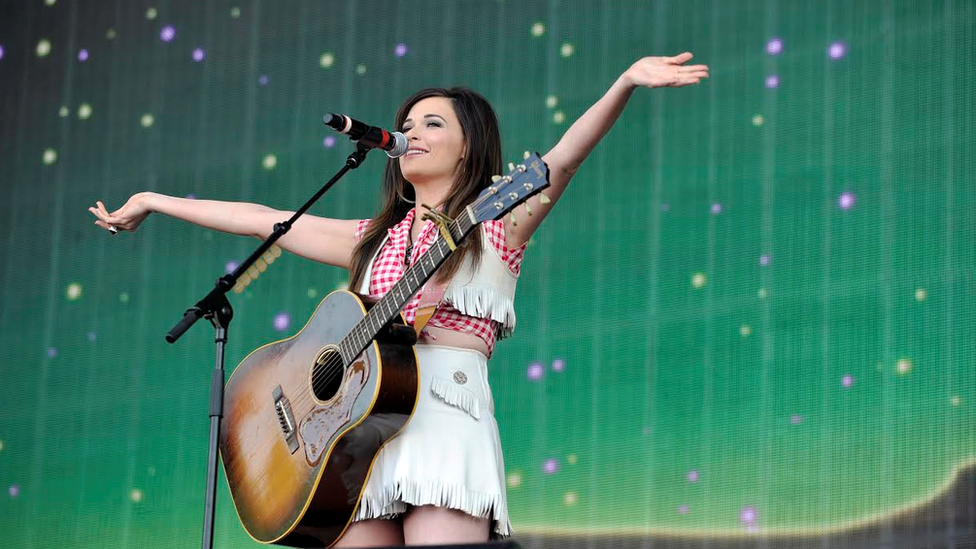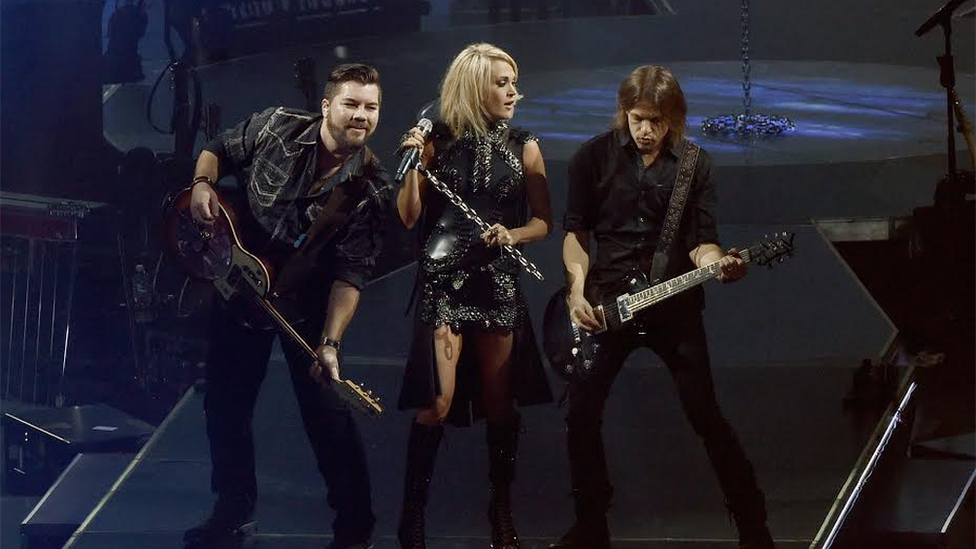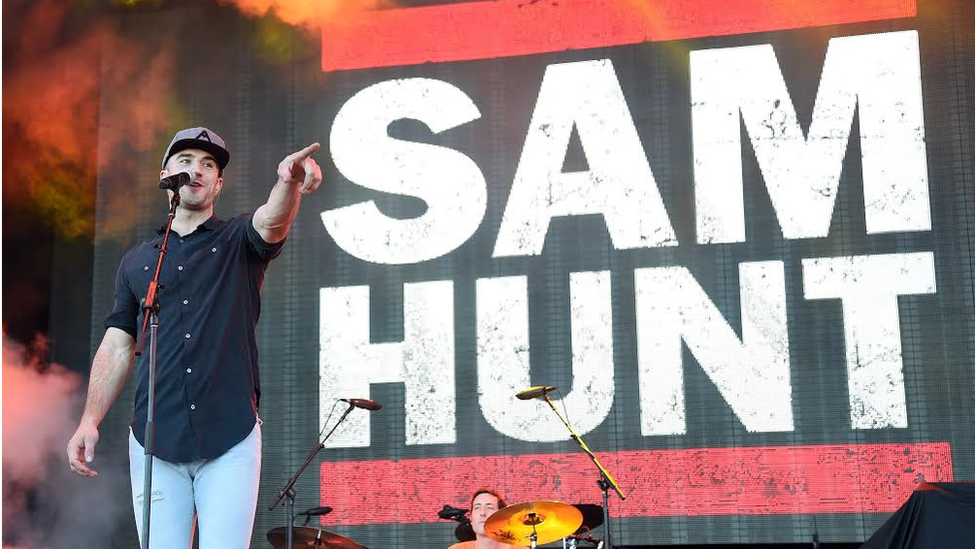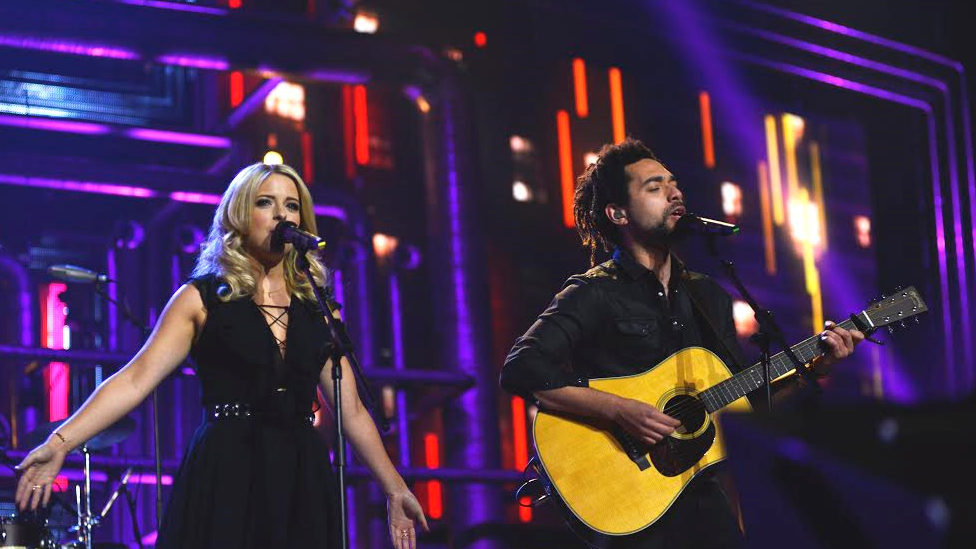Country To Country: Has Nashville conquered the UK?
- Published

Kacey Musgraves is part of a new generation of country artists who shun the conventions of the genre
You can blame Taylor Swift, you can blame Radio 2, you can blame the internet - but country music is finally gaining a stronghold in the UK.
The genre used to be something of a joke in the UK - all rhinestones, ten-gallon hats, line dances and honkeytonks - but now artists like Kacey Musgraves, Carrie Underwood and Lady Antebellum are permanent fixtures in the album chart.
At the heart of it all is the Country To Country (C2C) music festival, launched at London's O2 arena in March 2013 (March was picked because it falls outside country's peak summer touring season in the US).
The first year, headlined by Tim McGraw and Carrie Underwood, failed to break even but the artists went away impressed.
"It was so much fun," recalls Underwood - a former American Idol winner with 22 US number one singles to her name. "I felt the audience was very responsive and they seemed to have a really great time."
Fast-forward to 2016 and the festival has expanded to a three-day event, held simultaneously in London, Glasgow and Dublin.
"It's grown faster than we probably anticipated," Milly Olykan, the O2's festival director recently told Music Week magazine. "I go to Nashville quite regularly and I know that our reputation is spreading there."

Carrie Underwood returns to headline the Country To Country festival this weekend
So why has country finally gained a foothold in the UK after decades of disdain?
"This extraordinary surge in popularity has been coming for quite a long time," says Bob Harris, host of BBC Radio 2's Country Show, who will also present coverage of the festival on a dedicated pop-up digital radio station this weekend.
"When I first started doing my show in 1999, Nashville was still quite insular. The artists, people like Alan Jackson and George Strait, didn't put the UK that high on their priority list.
"Then, as time went by, I was discovering new artists like Keith Urban, who were much more willing to look outside the Tennessee border. Meanwhile, you've got a new generation of kids who were turned on to the sounds of modern country by Taylor Swift.
"All of these things have gradually come together, then - bang - there's C2C which is really the hub of it all, where it all converges each year.
"To see all the pieces of the country Lego come together in this way has been a really amazing experience."
'Melting pot'
Country To Country was originally dreamed up by the O2 and SJM Concerts in collaboration with the Country Music Association. It attracts an audience whose average age is 24-45, and which is evenly split between men and women.
But the real draw is the music - which has changed dramatically from the line-dancing days of Billy Rae Cyrus.
"Nashville and the South of America were very alien to us. It was very old-fashioned and extremely religious," says Ben Earle of UK country duo The Shires, who will make several appearances at this weekend's festival.
"But country music has become much more progressive. "
One of the chief innovators is Sam Hunt, a 30-year-old firebrand who scored three platinum-selling hits on the US country chart last year.
Inspired in equal measure by Garth Brooks, Otis Redding, Outkast and Usher, the singer has a half-sung-half-spoken delivery that makes him a close country cousin to pop star Ed Sheeran.
He hails - like a lot of country's most innovative new artists - not from Tennessee, but its Southern neighbour, Georgia.
The state, he says, is "a melting pot for a lot of different styles of music" which makes it a "trendsetter" in every genre.
"That mix of influences has become popular across the US - that blend of the soulful, Southern sound with the country storytelling lyric and even some of the more urban influences, hip-hop and R&B."

Sam Hunt incorporates elements of R&B and hip-hop into his music
Lyrically, Kacey Musgraves pushes the envelope further, talking about same-sex relationships and smoking marijuana. Her straight-talking approach has caused a few problems with censorious US radio stations, but endeared her to British fans.
She is one of the few artists at this weekend's festival who can headline her own UK tour - playing two dates at the Royal Albert Hall (and the Royal Variety Show) late last year.
"I've never been too scared to push buttons," she told Simon Mayo on BBC Radio 2, "but the things I sing about aren't that crazy to me. They're from the perspective of a 24 to 27-year-old girl.
"From the beginning I've felt like I may not be everybody's cup of tea - but I would rather have stronger fans in smaller numbers than a huge mass of people who don't really get me."
Carrie Underwood, who returns to headline the 2016 Country To Country festival, is excited that her genre - for so long self-referential and insular - has started to look outside itself for inspiration.
"Country has always been really great at telling stories and talking about life," she says, "but I do think it's become a little more broad in its influence.
"Music right now - music of any genre - it's all just so accessible. I don't really think anybody really listens to just one genre of music any more.
"So we have country music artists that are a bit influenced by rock music, or R&B music - which I think is really cool, because that means there's something for everybody."

The Shires are the first British country act to score a top 10 album
With more and more country records infiltrating UK daytime radio, Country To Country is being viewed as a way to introduce audiences and (perhaps more importantly) radio programmers to America's finest.
That's why you see artists who can sell out 100-date arena tours at home sharing the bill with their award show competitors.
It also explains why Nashville record label Big Machine - which represents Rascal Flatts, Tim McGraw and Taylor Swift - set up offices in London in January.
They're betting that the UK will come to embrace modern country, filling the void left by the lack of new, arena-sized rock bands.
"Looking out from the stage at last year's C2C, this music is bringing in a young audience who are much less conservative," says Bob Harris.
"They're down the front, they're dancing, they're really right in the middle of the energy of it all. And that has been a shot in the arm. It's brought this new, young energy into the music that will take it into the future."
Carrie Underwood agrees: "With every trip I make here, I feel like it's one step further to seeing everything grow and get bigger.
"That's the hope - the hope is just to be able to keep coming back."
